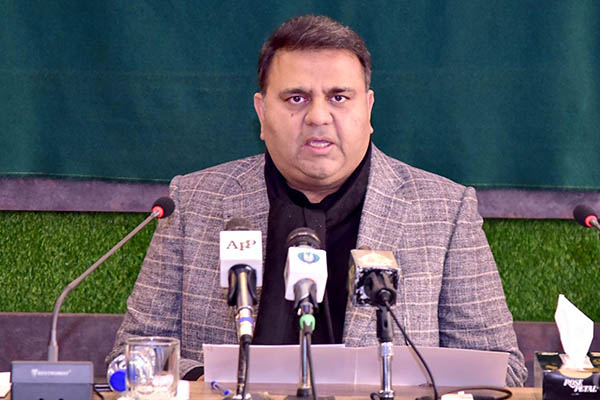
Photo courtesy PID
Information minister claims issues regarding former prime minister Nawaz Sharif’s repatriation from the U.K. have been ‘largely settled’
Opposition parties’ threats to overthrow the incumbent Pakistan Tehreek-e-Insaf (PTI)-led government are doomed to fail, as they lack the leadership required to pose a serious challenge, Information Minister Chaudhry Fawad Hussain announced on Tuesday.
“The current opposition leadership can only give their party workers false hope,” he told journalists after a weekly meeting of the federal cabinet. Deriding the anti-government protests announced by opposition parties, he said politics of agitation required a leader who could boldly take on the government and this was not possible for the “daily wage politicians” comprising the opposition.
“Imran Khan gave a tough time to the previous government as an opposition leader,” he said, claiming that even the PTI’s critics admitted how effective the incumbent prime minister had proven in the opposition. Singling out Jamiat Ulema-e-Islam (Fazl) chief Maulana Fazlur Rehman—whose party recently defeated the PTI in local body elections for Khyber-Pakhtunkhwa—Fawad said he had been issuing timelines to topple the government for the past three years.
National Security Policy
Fawad said the cabinet had approved Pakistan’s first-ever national security policy, which had already been approved by the National Security Committee earlier this week. He said this policy had established the existing links between economic strategy and geostrategic policy, adding that a country’s security could not be guaranteed if its economy did not prosper. “Until the common man is satisfied with the economic, social and legal situation, the security of the country will remain in danger,” he added.
He recalled that the policy had been in the works since 2014 and had been completed after input from 18 different ministries. He claimed that consensus could not be evolved on a National Security Policy in the past, but the incumbent government had incorporated the viewpoints of all stakeholders. He said the new policy also included internal and food security policies.
Nawaz Sharif’s return
The information minister claimed that—despite claims by several senior leaders of the Pakistan Muslim League (Nawaz)—former prime minister Nawaz Sharif would “never” return to Pakistan voluntarily. “They [Sharifs] would never return themselves; we will have to bring them back,” he claimed, adding that he had always opposed allowing Sharif to depart for London in 2019.
He said the federal government had been working on an extradition law with the U.K. for the past two years and the issues for its implementation were “largely” settled. “We have addressed most of the lacunas in the law after working with U.K. for the last two years and we will bring him back,” he claimed.
To a question, he claimed the government was not presenting a “mini budget,” but was merely undertaking adjustments to remove tax exemptions. He alleged this would not impact the common man—though economists have warned the removal of exemptions would inevitably lead to an inflationary surge that would impact all citizens. The minister also reiterated, per routine, the incumbent government’s claims that it had been forced to go to the International Monetary Fund for a bailout due to the “flawed” economic policies of previous governments. He urged the opposition to present an alternative plan if it believed the government’s plans were incorrect.
He stressed that the bill to remove the tax exemptions would be presented in the ongoing session of the National Assembly, adding that a special session of the cabinet with a single-point agenda would convene on it on Wednesday (today).
Urea production
Fawad said the cabinet had been briefed on urea production as the agriculture sector was the top priority of the government. He said the price of DAP fertilizer had increased in the international market, and its price had similarly increased in Pakistan as the country had to import over 70 percent of the commodity. He claimed that despite a natural gas shortage, the government had committed gas supply to urea plants to ensure its availability in the country.
The minister said the price of urea in the global market was around Rs. 10,500/bag, while its price in Pakistan was between Rs. 1,700 and 1,900. He claimed the country had sufficient stocks to maintain the price of urea but complaints persisted of hoarding and smuggling. He said the cabinet had directed the Punjab government to implement an effective crackdown on urea hoarders and smugglers. “If even one truck of urea is prevented from smuggling, about Rs. 8 million can be saved,” he claimed
He claimed there had been tremendous successes in agricultural produce in the past two years, with cotton, sugarcane, rice, wheat and maize crops all prospering. “There have been historic production of wheat, rice and sugarcane,” he said, adding that the government had added Rs. 1,100 billion to the agriculture sector and there had been visible increase in procurement of tractors, motorcycles, agro-medicines in rural areas.
Fawad said the cabinet had ordered the publication of the 2019 tax records of lawmakers, stressing no other sector had as much accountability as politicians. He said the cabinet, on the recommendation of the Finance Ministry, had also approved the names of the members of a new board of directors for the House Building Finance Corporation.
He said the cabinet had also approved the bill to increase coordination among various educational boards as well as the constitution of a joint investigation team to probe the killing of journalist Nazim Jokhio, who was shot dead in Karachi.
Fawad said the cabinet had also approved a proposal to convert Citizen Club in F-9 Park to Gandhara Heritage and Cultural Center, adding the prime minister would head its management committee. He said that the cabinet had approved a proposal to send to Cuba COVID-related medical equipment worth Rs. 23 million that had been manufactured in Pakistan.
